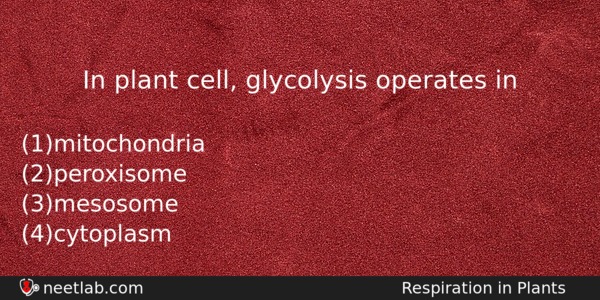| ⇦ | 
| ⇨ |
In plant cell, glycolysis operates in
Options
(a) mitochondria
(b) peroxisome
(c) mesosome
(d) cytoplasm
Correct Answer:
cytoplasm
Explanation:
The common aerobic respiration consists of three steps – glycolysis, krebs cycle and terminal oxidation. Glycolysis is the process of breakdown of glucose or similar hexose sugar to two molecules of pyruvic acid through a series of enzyme mediated reactions (occurs in cytosol) releasing some energy (as ATP) and reducing power (AS NADH₂). It is common to both plant and animal cells and to both aerobic and anaerobic modes of respiration.
Related Questions: - The gametophyte is not an independent, free living generation in :
- Hearing impairment affects which part of brain
- Cornea transplant in humans is almost never rejected. This is because
- Megasporangium is equivalent to
- Malpighian tubules remove excretory products from
Topics: Respiration in Plants
(184)
Subject: Biology
(4253)
Important MCQs Based on Medical Entrance Examinations To Improve Your NEET Score
- The gametophyte is not an independent, free living generation in :
- Hearing impairment affects which part of brain
- Cornea transplant in humans is almost never rejected. This is because
- Megasporangium is equivalent to
- Malpighian tubules remove excretory products from
Topics: Respiration in Plants (184)
Subject: Biology (4253)
Important MCQs Based on Medical Entrance Examinations To Improve Your NEET Score
18000+ students are using NEETLab to improve their score. What about you?
Solve Previous Year MCQs, Mock Tests, Topicwise Practice Tests, Identify Weak Topics, Formula Flash cards and much more is available in NEETLab Android App to improve your NEET score.
Share this page with your friends

Leave a Reply